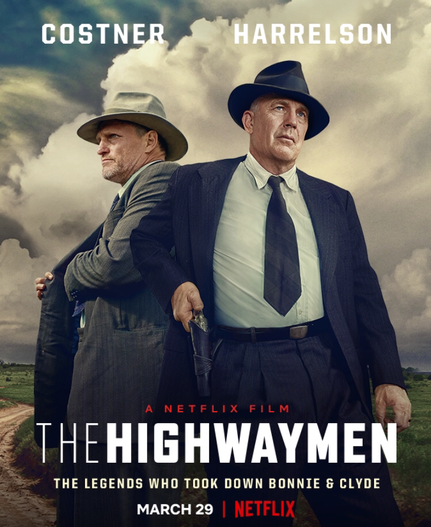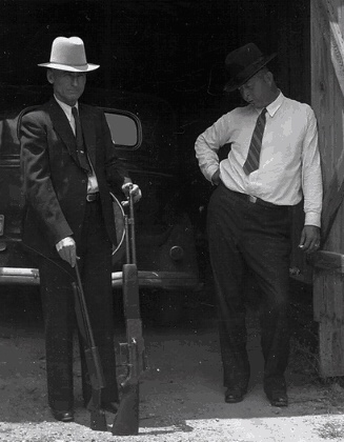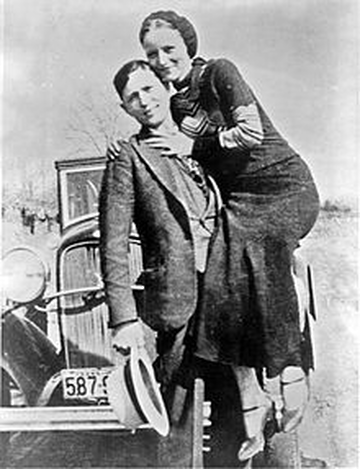 Sam Burnham, Curator @C_SamBurnham I want to take a closer look at some of the themes in this film. There’s a lot going on here and I’d like to examine it in light of the earlier commentary on Hell or High Water. Again we see Texas Rangers chasing down bank robbers. Again we see, on a much larger scale this time, an affinity for the outlaws from the general public. The evil banks are getting theirs and there is a cult of personality, a wild fandom that has grown out of the gratitude the people have for what they believe is vengeance, a reckoning even. Looking at one of the Rangers, Maney Gault, played by Woddy Harrelson, we see a man who is struggling with events that haunt him. These events date back to the earliest days in his career when he and his partner, Frank Hamer, played by Costner, raided an encampment of Mexican bandits, killing dozens, including a young boy. The memories drive his convictions as he expresses adamantly that how they conduct themselves should reflect that they are better than the monsters they seek.  Gault & Hamer, the men who took down Bonnie & Clyde Gault & Hamer, the men who took down Bonnie & Clyde A pivotal scene is when Hamer confronts Clyde Barrow’s father, Henry, played by William Sadler. The two discuss how Clyde evolved from a “good kid” to a murderous outlaw and, in turn, how Hamer became a Texas Ranger and eventually a highwayman on a special assignment to take down Bonnie and Clyde. Like any father would, Barrow points to the good in his son. He wants Hamer to know this wasn’t how his boy was raised or who he really was. They discuss the idea of “one turn on the trail,” the idea that one decision can lead to a series of decisions that can change the course of a life. While Barrow is defending his son, he also stresses to Hamer that the only way this rampage ends is with Clyde’s death. He’s almost weeping as he asks Hamer to end it quickly. A father has already lost his son. What must come will bring an odd relief to his family. That end comes as Gault and Hamer, with the help of a Dallas deputy and a Louisiana sheriff and deputy, set an elaborate trap for Bonnie and Clyde. The moment they spring that trap is the first real glimpse you get of the couple. They’re young, attractive, well dressed. They don’t look like soulless monsters. They look like two kids with their whole lives ahead of them. That is where you feel that tug at your heart as the barrage of gunfire erupts and their youthful bodies are obliterated by hundreds of bullets. It is all so senseless and yet, there was no other way their violent rampage was ever going to end. What we should take take away from this film is a true and complete respect for and commitment to the sanctity of human life.  Bonnie and Clyde, not your typical outlaws Bonnie and Clyde, not your typical outlaws Bonnie and Clyde were revered for what they did because everyday folks cheapened the lives of bankers. Hamer and Gault were each tormented in their own ways for their taking of human life. Bonnie and Clyde found their own unnecessary destruction through their disregard for human life. Viewers are left to ponder the value of human life as two beautiful yet sinister people are blown to smithereens. If we value human life, we value all human life. And that can seem like a paradox at times. When Hamer and Gault stormed the lair of the bandits and killed them, it ended a terrible threat to human life. But it also ended human lives. When they killed Bonnie and Clyde, it ended the threat of violence to banks, law enforcement, and even average people, but it also cost the lives of two human beings. In the end the deaths were beneficial for the safety of others. But that doesn’t make the loss of life something to celebrate. In the case of Bonnie and Clyde, their souls died long before their bodies were killed. What really could have come from their lives? What of the grief of their families? What of missed opportunities? What of wasted lives? In short, killing them was necessary. It was the only way to save lives but their deaths were no less tragic for it.  ABG Sponsor - Click For Link ABG Sponsor - Click For Link Valuing himan life does not mean never killing. It means that sometimes killing is the only way to save life. It means being willing to kill to save lives. But it also means that killing, no matter how necessary, is never good. There’s a toll that killing takes on the human psyche. There’s a cost for all involved. The best option is to value human life and prevent the death of the soul that builds monsters like Bonnie and Clyde. This means appropriate methods of incarceration and rehabilitation. This means education and mentoring. It means loving life first and applying appropriate and necessary justice while maintaining our own souls and not becoming the monsters we fight. The Highwaymen offers many lessons in life , love, mercy, and justice. We’d be wise, as individuals and a society, to take these lessons, learn from them, and apply them.
0 Comments
Leave a Reply. |
Sam B.Historian, self-proclaimed gentleman, agrarian-at-heart, & curator extraordinaire Social MediaCategories
All
Archives
November 2022
|




 RSS Feed
RSS Feed
